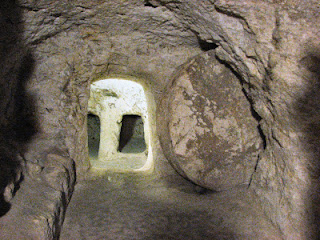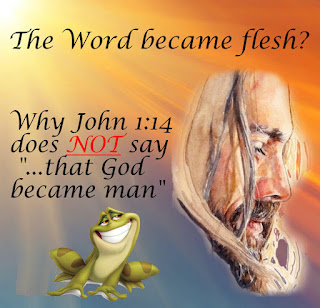What about John 1:1?
A summary of the One God Report podcast, "What about John 1:1?"
Ever since I came to understand from the Bible that God (Yehovah, YHVH) is one, and that Jesus is God’s human Messiah (Christ) whom God raised from the dead, people say to me: “What about John 1:1?”. For my friends who believe in the “deity of Christ”, John 1:1 is biblical evidence that Jesus is God.
But is it?
In this podcast we begin to take a look at the Gospel of John and see that the Trinitarian or "deity of Christ" interpretation of John 1:1 is found wanting.
We show four "broader view" observations about the Gospel of John to see there is something wrong with the Trinitarian interpretation:
1. The purpose for writing
The author of the Gospel of John tells us the purpose he wrote his book, or at least why he recorded the signs that Jesus did. “Now Jesus did many other signs in the presence of the disciples, which are not written in this book; but these are recorded so that you might believe that Jesus is the Messiah, the Son of God, and that believing you may have life in his name” (John 20:30-31).
The Trinitarian "deity of Christ" interpretation of John 1:1 is contradictory to the author's own purpose statement.
We present what it means to be the "Son of God", describing biblical examples and characteristics, rejecting the definition of the Hellenized "church fathers" of later centuries.
2. No Trinity in John’s Gospel
In the Gospel of John, “God” is never the Trinity. Trinitarians should at least acknowledge that there is no Trinity described in John 1:1 (or anywhere else in John’s Gospel). Try replacing the word "Trinity" for the word "God" in the Gospel of John, and see if that makes sense. For instance, "In the beginning was the Word, and the Word was with the Trinity, and the Word was the Trinity"
How about John 3:16: "For the Trinity so loved the world, that he (it?) sent his (its) unique Son...."
It is strange that for the biblical book that is supposedly the main book that presents Jesus as God and that God is a Trinity, nowhere in the book does "God" mean "the Trinity. More details here: https://landandbible.blogspot.com/2019/10/did-trinity-so-love-world-in-gospel-of.html
3. In the Gospel of John, Jesus is the Messiah, not God
The question that the Gospel of John addresses and answers is: "Is Jesus the Messiah", not "Is Jesus God" or "Is the Messiah God". We see being "the Messiah" is the question from the beginning of the book to the end: John 1:17, 1:20, 1:41, 4:25-26, 7:26, 7:41, 9:22, 10:24, 17:3, 20:31.
4. Jesus in the Gospel of John distinguishes himself from God
In John 8:40 Jesus says he is a "man who heard the truth from God". Jesus distinguished himself from God, from all of God, not just from "one person of the Godhead". Likewise Jesus distinguishes himself from God in John 17:1-3 when he says that the Father is the "only true God" and that he, Jesus, is the Messiah sent by God.
5. Finally, we ask the question, and leave open for later examination, what beginning is intended by the words of John 1:1, "In the beginning was the Word..." Is this beginning a direct reference to the Genesis creation, or does the author of the Gospel of John have in mind a new beginning? How is "the beginning" used in other places in John's Gospel, in John's Epistles, and in the Book of Revelation?


Comments